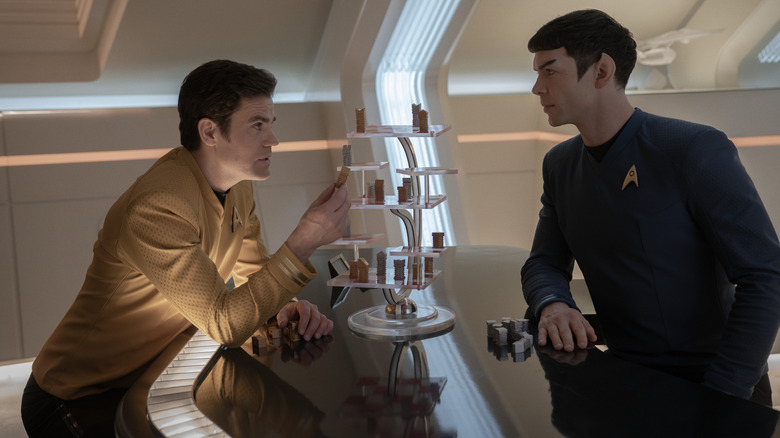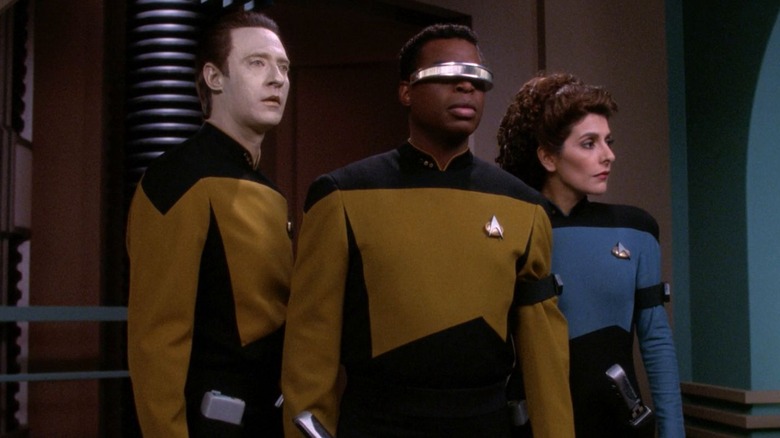A Legendary Star Trek Writer Has The Same Criticism As Fans About Short TV Seasons
As hard as it may be to believe, there was a time when seasons of weekly television shows ran a whopping 26 episodes. Every week for a solid nine months — usually from late September to mid-June — Hollywood would churn out one-hour-drama after one-hour-drama, hoping to keep their series high-quality, varied, and intriguing. The lengthy seasons assured the cast and crew intense, steady work for most of the year, while fans would be assured a high volume of drama and adventure. Also, at the time, only daytime soap operas gained dramatic traction by telling prolonged, interconnected stories. Nighttime TV viewers weren't necessarily going to see episodes in order, something that became doubly true in reruns and re-broadcasts. As such, each episode had to stand on its own. That meant writers had to conceive of 26 separate and distinct stories every year.
This was certainly true of the "Star Trek" franchise in the 1990s. With a few exceptions, most seasons of "Star Trek: The Next Generation," "Star Trek: Deep Space Nine," "Star Trek: Voyager," and "Star Trek: Enterprise" ran 26 episodes apiece. At the end of its seventh season, "Next Generation" had accrued 178 episodes. That's a lot.
Compare that with today's "Star Trek" shows. "Star Trek: Strange New Worlds" has only put out 30 episodes after its first three seasons. 10 episodes per season seems incredibly slight, and Trekkies have certainly noticed the downgrade. Sure, the stories on "Strange New Worlds" may still be interesting, but when the season is gone in 10 weeks, it makes the entire series feel insubstantial. At least comparatively.
Brannon Braga, one of the star writers on 1990s "Star Trek" projects and the co-creator of "Enterprise," feels the same way. Appearing at a "Star Trek" convention (covered by TrekMovie), Braga talked about how disappointingly short modern "Star Trek" seasons are, comparing them to meaningless dating hook-ups or short-term romantic relationships.
Brannon Braga, like everyone, thinks TV seasons are too short
Braga doesn't just think TV seasons are too short; he also bristles at home much time elapses in between many seasons. Indeed, some seasons will be split into two halves and then spread out over a year, making the experience feel brief and disjointed. The now-canceled animated series "Star Trek: Prodigy," for example, was infamously split apart, with its first four episodes running in October and November of 2021, only for its next six episodes to drop in January and February of 2022. It then took an eight-month hiatus, not starting up again until October of 2022. Those 20 episodes, we're meant to believe, form the show's first season. As if that wasn't enough, the show was subsequently (and guiltily) shunted over to Netflix, with all 20 episodes of the second season dropping in a single day.
As one of the head writers on "Voyager" (not to mention one of the show's executive producers), Braga attended the annual STLV convention in Las Vegas, Nevada, to greet the many lingering fans of the series. There, Braga made it clear that he feels that "Voyager" only had fans because of its volume of episodes. With shorter seasons, personal relationships can't grow as strong. As he put it:
"'Voyager' was 26 episodes a year. Some of you probably keep it on because it's cozy, and that's the kind of relationship you had. A lot of shows now are Tinder relationships; eight episodes every two years? I don't think so. That's not going to be something you necessarily pass on to your kids. And I think that's a loss ... It's a new paradigm. And some shows are still doing it ... 'NCIS' does, like, 22. But I really don't know what's in store for the future of 'Star Trek,' the TV franchise anyway. But I hope — I hope — that eventually they get back to a longer, more sustained season."
"NCIS," on average, has had 22.1 episodes per season (although its 21st season, which debuted in 2021, was only 10 episodes).
Star Trek TV seasons are unlikely to get longer anytime soon
As of this writing, "Star Trek: Strange New Worlds" has just wrapped its third season and is set to return for both a fourth and fifth seasons, each of which will likely be another 10-episode jaunt (at most). Similarly, "Star Trek: Picard" ran for three 10-episode seasons, while "Star Trek: Discovery" was at least a little longer lived, amassing 65 episodes across five seasons (or 13 episodes per season on average). But while Braga and many Trekkies wish for prolonged seasons of "Star Trek" TV shows, the streaming era doesn't seem conducive to the idea at the moment. (Again, there are exceptions; network crime shows are still on the ball, with "Law & Order" still topping 22 episodes every year.)
And things are only getting more fractured. It's running without much fanfare, but an animated "Star Trek" series for toddlers, titled "Star Trek: Scouts," is currently being released in fits ... on YouTube. And not even on the "Star Trek" YouTube channel; it's only on a sub-heading on the channel devoted to "Blaze and the Monster Machines." The upcoming series "Star Trek: Starfleet Academy" will also run for only 10 episodes a season. It seems the creatives behind the franchise simply aren't in a position to make a show that airs over nine straight months for upwards of 26 episodes.
Nowadays, as Braga noted, the old ways of doing television seem almost unreal. "It's hard to make big TV shows," he remarked. "It's complicated. Then again, how did we do 26 episodes? It's like a miracle." Admittedly, Braga probably doesn't miss the workaday grind or the occasional dud episodes that a rigorous TV schedule often elicits. But he, like we all do, misses living on a starship for an extended period.


